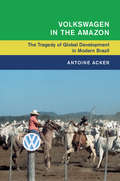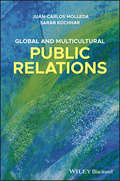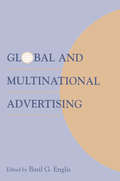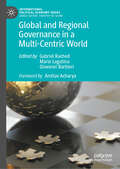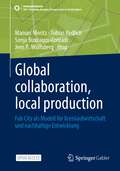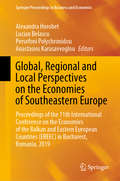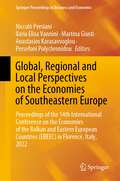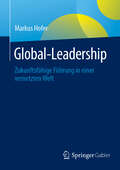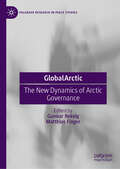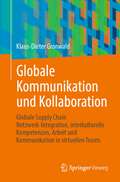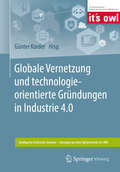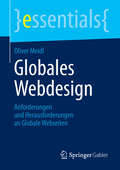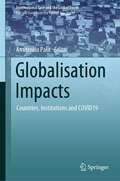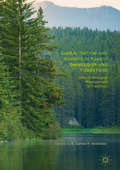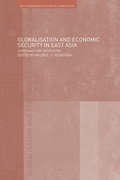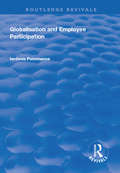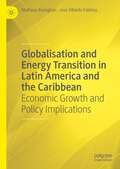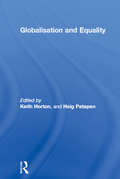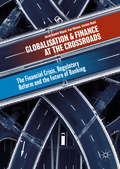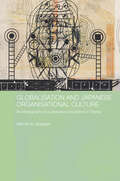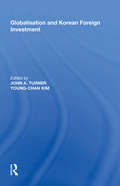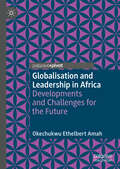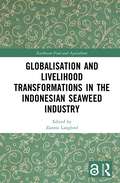- Table View
- List View
Global and International History: Of Limits and Growth
by Stephen J. MacekuraOf Limits and Growth connects three of the most important aspects of the twentieth century: decolonization, the rise of environmentalism, and the United States' support for economic development and modernization in the Third World. It links these trends by revealing how environmental NGOs challenged and reformed the development approaches of the US government, World Bank, and United Nations from the 1960s through the 1990s. The book shows how NGOs promoted the use of 'appropriate' technologies, environmental reviews in the lending process, development plans based on ecological principles, and international cooperation on global issues such as climate change. It also reveals that the 'sustainable development' concept emerged from transnational negotiations in which environmentalists accommodated the developmental aspirations of Third World intellectuals and leaders. In sum, Of Limits and Growth offers a new history of sustainability by elucidating the global origins of environmental activism, the ways in which environmental activists challenged development approaches worldwide, and how environmental non-state actors reshaped the United States' and World Bank's development policies.
Global and International History: The Tragedy of Global Development in Modern Brazil (Global and International History)
by Antoine AckerFrom 1973 to 1987, Volkswagen's (VW) 140,000 hectare 'pioneer' cattle ranch on the Amazon frontierlaid barethe limits of capitalist development. These limits were not only economic, with the core management of a multinational company engaged in the 'integration' of an extreme world periphery, but they were also legal and ethical, with the involvement of indentured labor and massive forest burning. Its physical limits were exposed by an unpredictable ecosystem refusing to submit to VW's technological arsenal. Antoine Acker reveals how the VW ranch, a major project supported by the Brazilian military dictatorship, was planned, negotiated, and eventually undone by the intervention of internationally connected actors and events.
Global and Multicultural Public Relations: Strategies In Transnational Corporations, Governments, Nongovernmental And Multilateral Organizations, Agencies
by Juan-Carlos Molleda Sarab KochharAn overview of the practice of strategic global and multicultural public relations in various sectors Global and Multicultural Public Relations offers students an expert overview of specific public relations practices, focused on strategic analyses of actual case studies and real-world examples. Emphasizing practice rather than theory, this valuable resource explores innovative communication programs that are designed to address culturally-diverse communities worldwide. The five-step strategic public relations process—formative research, planning, implementation, evaluation, and stewardship—is extensively examined and applied to a variety of scenarios, helping students understand the realty of modern public relations practice. All aspects of public relations practice, including media relations, government relations, employee communications, and shareholder relations are covered to help students gain solid foundational knowledge. Broad in scope, this textbook identifies and describes the strategy formulation and implementation process in private, government, non-profit, and various other sectors. Academic and trade articles, book chapters, original case studies, and new primary research offer students a realistic and sophisticated approach to global public relations. Figures, tables, photographs, and charts illustrate each topic, while highlighted learning objectives and key points, discussion questions, and framed sections on ethical considerations and best practices strengthen student comprehension. Employs a real-world approach to public relations principles, practices, and strategies Focuses on global public relations rather than outdated nation-centered models Fills a gap in current literature on multinational and multicultural public relations Explains the public relations strategies that are best suited for each sector Includes summary sections that contain suggested readings and supplemental online links Designed for upper-level undergraduate and graduate students, Global and Multicultural Public Relations is an ideal textbook for courses in international public relations, global communication, public relations management, and multinational management, as well as business, political sciences, and public administration.
Global and Multinational Advertising
by Basil G. EnglisFew applied disciplines are more sensitive to cross-cultural issues than marketing and consumer psychology. The chapters prepared for this volume reflect awareness of both similarities and differences within and across cultures. They include analyses of methodological issues, theoretical investigations of cultural and social values and their implications for marketing specialists, studies of gender- and sub-culture specific advertising, and investigations of advertising efforts in several different international markets. The scholars and advertising professionals who contributed these chapters will have much to say to consumer psychologists and marketing specialists alike.
Global and Regional Governance in a Multi-Centric World (International Political Economy Series)
by Maria Lagutina Gabriel Rached Giovanni BarbieriIn a world shaken by constant crises and shifting power dynamics, Global and Regional Governance in a Multicentric World delves into the core of the global governance system, exploring its flaws, its evolution, and the forces seeking to reshape it. As the Western-crafted liberal order faces unprecedented scrutiny, this book provides a timely analysis of how emerging powers - China, Brazil, India, South Africa, and others - are challenging traditional governance models, proposing alternatives that better reflect their values, interests, and aspirations. From Asia to Africa, Latin America to Eurasia, this book examines how these regions, collectively known as “the Rest” or “the Global South,” are responding to the shortcomings of a global system long dominated by Western interests. Through insightful regional studies, the authors highlight how “rising powers” are no longer willing to remain peripheral players; instead, they are pushing for a more inclusive, representative, and effective global framework. Rooted in the latest international relations trends, this book offers an incisive exploration of new governance models emerging in a “multi-centric” world. It raises pressing questions about global stability as follows: Will these rising powers succeed in transforming the global order? How do they envision international cooperation? Can their ideas coexist with established Western powers? Through this work, readers gain a nuanced understanding of the forces shaping tomorrow’s world and the potential pathways for reform. Ideal for scholars, policymakers, and those with a keen interest in world affairs, Global and Regional Governance in a Multicentric World is a compelling call to rethink contemporary global governance and the possible paths of the international agenda in an era where traditional multilateralism is no longer able neither sufficient to address the pressing challenges from our interconnected world.
Global collaboration, local production: Fab City als Modell für Kreislaufwirtschaft und nachhaltige Entwicklung (SDG - Forschung, Konzepte, Lösungsansätze zur Nachhaltigkeit)
by Jens P. Wulfsberg Tobias Redlich Manuel Moritz Sonja Buxbaum-ConradiDieses Open-Access-Buch gibt aktuelle interdisziplinäre Forschungseinblicke rund um das Fab City-Konzept. Ein Ansatz, der beschreibt, wie Produktions- und Konsumptionsweisen gestaltet werden können, sodass einerseits globale Kollaboration in und durch Communities von der Ideengenerierung bis zur Produktentwicklung physischer Güter mittels quelloffener Technologien (Open Source Software und Hardware) ermöglicht wird und andererseits die Produktion dieser Güter lokal und somit möglichst nahe am Ort des Bedarfs sowie dezentral im Sinne einer verteilten Produktion erfolgen kann, beispielsweise in Fab(rication) Labs. Ziel ist die Schaffung einer möglichst nachhaltigen Produktion bzw. Wertschöpfung. Ökologisch nachhaltig, indem lange Transportwege vermieden und auf Grundlage von Kreislaufprinzipien lokale Stoffkreisläufe geschlossen werden. Ökonomisch nachhaltig, indem durch quelloffene Technologien Wettbewerbsbeschränkungen und durch föderierte Ansätze Abhängigkeiten vermieden werden. Sozial nachhaltig durch ein partizipatives Wertschöpfungssystem, in dem der Zugang zu Wissen und Knowhow sowie zu Produktionsmitteln unbeschränkt ist. Über den gesamten Produktentstehungsprozess und -lebenszyklus enthält das vorliegende, bilinguale Werk in deutscher und englischer Sprache Beiträge aus den Bereichen Citizen & Collaborative Innovation and Design, Circular Design & Economy, Open-Source-Software-Tools für die Entwicklung von Open Source Hardware, Digital Product Passport, föderierte (Open-Source-) Systeme, die Verbreitung von Open Source Hardware sowie technical literacy und economic governance.Prof. Neil Gershenfeld, Director of MIT’s Center for Bits and Atoms, and Chairman of the board of The Fab Foundation:“For many years the growth of cities has been an inexorable trend, with cities acting as regional magnets and engines;the resources enabling a Fab City can also help expand opportunity beyond cities. There is now an opportunity and need for labs that can develop, deploy, and measure the frontiers of Fab City technologies. This book provides a much-needed snapshot of the current state of that challenge.”Tomas Diez, Executive Director of the Fab City Foundation: “This book is an invitation for large-scale collaboration to build distributed system that can support the development of alternative modes of production, in line with the social and ecological needs of our time.”
Global, Regional and Local Perspectives on the Economies of Southeastern Europe: Proceedings of the 11th International Conference on the Economies of the Balkan and Eastern European Countries (EBEEC) in Bucharest, Romania, 2019 (Springer Proceedings in Business and Economics)
by Anastasios Karasavvoglou Persefoni Polychronidou Alexandra Horobet Lucian BelascuThis book includes papers presented at the 11th International Conference “Economies of the Balkan and Eastern European Countries” (EBEEC), held in Bucharest, Romania, in May 2019. It sheds new light on the micro- and macroeconomic developments in the Eastern European and Balkan countries, while at the same time taking into account the broader regional and global factors influencing these developments. By examining how the decisions and the performance of economic, social and political actors in the region are intertwined with wider regional and global events, the contributions highlight the dynamic development in Eastern Europe and the Balkans region. Further, the book demonstrates how the region has overcome numerous challenges in the past and is evolving within the framework of European economic integration and the global effervescent economy.
Global, Regional and Local Perspectives on the Economies of Southeastern Europe: Proceedings of the 14th International Conference on the Economies of the Balkan and Eastern European Countries (EBEEC) in Florence, Italy, 2022 (Springer Proceedings in Business and Economics)
by Anastasios Karasavvoglou Persefoni Polychronidou Niccolò Persiani Ilaria Elisa Vannini Martina GiustiThis book includes papers presented at the 14th International Conference “Economies of the Balkan and Eastern European Countries” (EBEEC), held in Florence, Italy, in May 2022. It sheds new light on the micro- and macroeconomic developments in the Eastern European and Balkan countries, taking into account also the broader regional and global factors influencing these developments. In particular, it includes the latest theoretical and empirical research and policy insights from Central and Southeastern Europe and presents new ideas on how to resolve economic problems, also generated by the pandemic, in the Balkan and Eastern European economies in a pan-European context. By examining how the decisions and the performance of economic, social, and political actors in the area are intertwined with wider events, also at a global level, the papers highlight the dynamic development in Eastern Europe and the Balkans region. Further, the book demonstrates how the area is evolving within the framework of European economic integration and the global effervescent economy.
Global-Leadership: Zukunftsfähige Führung in einer vernetzten Welt
by Markus HoferGlobalisierung ist heute in Zeiten der wirtschaftlichen Herausforderung wieder deutlich präsenter. Dies hat einen direkten Einfluss auf Führungskräfte, die globale Teams führen. Organisationen brauchen mehr Global-Leader. Das praxisorientierte Fachbuch stellt das Global-Leadership-Modell vor, welches Führungskräften globaler Organisationen Orientierung bietet. Erfolgreiche Führungskräfte globaler Unternehmen benötigen ein spezifisches Set an Kompetenzen, die umfassend im Buch vorgestellt werden. Durch eine Selbstanalyse können künftige und aktive Führungskräfte eine Standortbestimmung ihrer Kompetenzen vornehmen. Das Buch richtet sich an angehende und aktive Führungskräfte, Geschäftsführer, Projektmanager und Interessierte. Sie lernen, wie sie sich zum Global-Leader entwickeln und ihr international tätiges Unternehmen strukturiert weiterentwickeln und führen können. Der Inhalt Globale Dynamiken im Wandel Herausforderung für Global-Leader: Führung, Distanz, Change-Management, Technologie, Kultur, Organisation, Mindset Global-Leadership-Modell Global-Leaders: Mindset, Wissen, Strategie, Kompetenzen, Vertrauen, Diversity Management Selbstanalyse zur Standortbestimmung eines Global-Leaders
GlobalArctic: The New Dynamics of Arctic Governance (Palgrave Research in Peace Studies)
by Matthias Finger Gunnar RekvigThe third volume in the Global Arctic series examines the transformation of Arctic governance following the 2022 outbreak of war in Ukraine. This conflict has disrupted the post-Cold War cooperative circumpolar order, upending decades of multilateral collaborations. The book traces the Arctic's evolution from Cold War great power competition to a focus on human security and cooperation, highlighting the Arctic Council's establishment and the growth of the "Arctic family" with non-Arctic actors. It explores how climate change became a key driver for Arctic (re)engagement, opening new opportunities and challenges. The 2022 invasion of Ukraine has dramatically altered this landscape, ending the post-Cold War era of collaboration and ushering in the post-post-Cold War era, raising critical questions about regional cooperation, climate change mitigation, and global security. This book brings together diverse expert perspectives to analyze the rapidly changing geopolitical dynamics of the Arctic. It explores the tension between collaboration needs and resurgent great power competition, offering valuable insights for policymakers, scholars, and students. As global power dynamics shift and climate change threatens, understanding Arctic governance challenges becomes imperative. This book serves as an essential resource for navigating the complex Arctic political landscape and examining how new divisions are reshaping the region's future.
Globale Kommunikation und Kollaboration: Globale Supply Chain Netzwerk-Integration, interkulturelle Kompetenzen, Arbeit und Kommunikation in virtuellen Teams
by Klaus-Dieter GronwaldDie technologiegetriebene Digitalisierung globaler Supply Chain-Netzwerke hat viele Facetten. Sie steht im Spannungsfeld politischer, ökonomischer, ökologischer und gesellschaftlicher Faktoren. Der Erwerb notwendiger Kernkompetenzen in den Bereichen Big Data, In-Memory Computing, Machine Learning und Data Management ist zwingend. Blockchains, Smart Contracts und Due Diligence für Supply Chain Management-Systeme beeinflussen den Wandel von einer Shareholder-dominierten Unternehmensführung zu einer Stakeholder-fokussierten globalen Unternehmensverantwortung mit ethischen Werten. Das Verständnis kultureller Unterschiede in Arbeitsstilen ist ein Schlüssel zu einer erfolgreichen globalen Teamarbeit. Die wichtigsten Theorien zur Internationalisierung von Unternehmen und zu kulturellen Dimensionen/Distanzen werden diskutiert, um interkulturelle Kompetenzen und Konfliktmanagementstile für internationale Projektmanager zu entwickeln.Leserinnen und Leser lernen die Herausforderungen internationaler Kooperation kennen und können die für die Bedürfnisse globaler virtueller Teams relevanten Formen der Zusammenarbeit unter Einsatz von Technologien und Medien anwenden.
Globale Vernetzung und technologieorientierte Gründungen in Industrie 4.0 (Intelligente Technische Systeme – Lösungen aus dem Spitzencluster it’s OWL)
by Günter KorderDieses Fachbuch beschreibt die Aktivitäten des Spitzenclusters it’s OWL und konzentriert sich hier auf die Nachhaltigkeitsmaßnahmen Internationalisierung und Unternehmensgründungen, die einen entscheidenden Teil zur langfristigen und umfassenden Stärkung des Spitzenclusters und der Region OstWestfalenLippe beitragen. Es gibt somit eine Antwort darauf, wie eine geschaffene Entwicklungsdynamik über eine definierte Dauer hinaus Wirkung ausübt und in dem vorliegenden Fall die Wettbewerbsfähigkeit einer Region nachhaltig unterstützt. Die Perspektive der Autoren erlaubt einen praktischen Einblick in die Tätigkeiten des Spitzenclusters it’s OWL und erweitert somit das Verständnis von Experten und Fachkräften.
Globales Webdesign: Anforderungen und Herausforderungen an Globale Webseiten (essentials)
by Oliver MeidlDie Online-Welt vereint Faszination über neue Möglichkeiten mit zunehmender Selbstverständlichkeit. Globales Webdesign gewinnt durch die fortschreitende Internationalisierung des Handels, die Zunahme interkultureller Kommunikation und weltweite Vernetzung an Relevanz und Wichtigkeit. Oliver Meidl beschreibt Anforderungen an globale Webauftritte und bespricht Herausforderungen in einem heterogenen, multinationalen Umfeld. Er adressiert das Verständnis für lokal-bedinge Eigenheiten ebenso wie den Transport von Inhalten zwischen unterschiedlichen Kulturen und Maßnahmen zur Vermeidung ,,kultureller Stressoren".
Globalisation Impacts: Countries, Institutions and COVID19 (International Law and the Global South)
by Amitendu PalitThe book reviews globalisation by identifying causes behind the discontent it has produced in recent years. It variously engages in economics, political economy, development and policy discourses to study experiences of countries and institutions in managing and adjusting to globalisation. Extending the analysis to latest global developments, including the remarkable advance of technology and digitalisation, and political and economic upheavals caused by COVID19, the book collects varied academic perspectives and reflects on the present as well as future. Comprising chapters written by distinguished academics and policy experts, the book is a rare collection of cross-disciplinary objective evaluations of globalisation.
Globalisation and Change in Forest Ownership and Forest Use
by E. Carina KeskitaloThis book describes the changing landscape of European forest ownership and explores the impact a new, often urban, generation of forest owners may have on the future of one of our most basic resources – forests. Forests have not played a major role in rural studies thus far, however they constitute an important part of many rural areas. Drawing on Swedish cases and comparison cases from various other areas of Europe, the authors present these ‘new forest owners’ as a pivotal factor in the changing relationships between urban and rural life. The chapters explore how forest production, the relationship to the environment, urban-rural relations and local communities have already changed as well as discussing what might be expected for the future. A result of work in the Swedish research programme PLURAL and related projects, such as the EU Cost Action FACESMAP, this volume will be of interest to scholars of forestry and rural studies, as well as to researchers in environmental, population and globalization studies more broadly.
Globalisation and Economic Security in East Asia: Governance and Institutions (Routledge Studies in Globalisation)
by Helen E. S. NesaduraiWhat is the relationship between globalization and economic security? Globalisation and Economic Security in East Asia is an incisive new engagement with this important question that uses detailed conceptual exploration and fresh empirical analysis. Viewing traditional neorealist conceptions of economic security as overly narrow, this new study suggests that any conception of economic security in the contemporary era needs to also pay close attention to the nature of global capitalism, and the insecurities it generates for societies and individuals. This uniquely open-ended approach to conceptualizing economic security is supported by the East Asian experience. The country case studies included here reveal that while economic security has largely been posed as one of ensuring sustainable economic growth and equitable social development, particularly following the 1997 to 1998 Asian financial crisis, other, more realist conceptions of economic security have not become irrelevant. This is also an exploration of whether and how national, regional and multilateral institutions, as well as non-state regional mechanisms, help policy makers meet the task of governing in the interests of economic security. This book will be of great interest to all students and scholars of international relations, international political economy of East Asia globalization and security studies.
Globalisation and Employee Participation (Routledge Revivals)
by Iordanis PsimmenosFirst published in 1997, this is an important and wide-ranging book. It is rooted in a fascinating, research-based case study of employee participation in the state-owned Greek public power (electricity) corporation. Drawing on extensive familiarity with the relevant literatures, however, it also provides a full appreciation of the significance of this case by placing it within both the history and current framework of employee organisation and industrial relations in Greece, and the development of Greece as a peripheral capitalist society in a global economy. By exploring the issue of employee participation in this way Dr Psimmenos not only makes a unique, original contribution to the study of industrial organisation and management-worker relations in Europe but also shows the impact which the institutions and processes of globalisation have upon a society and economy like Greece – part of the European Union and also subject to the constraints of international capitalism. Globalisation and Employee Participation will be welcomed by academics and researchers in sociology, politics, industrial relations and political economy, as well as those concerned with the history and present state of Greece and other Mediterranean societies. It is a valuable, scholarly addition to the literature in these areas.
Globalisation and Energy Transition in Latin America and the Caribbean: Economic Growth and Policy Implications
by Matheus Koengkan José Alberto FuinhasThis book explores the potential for renewable energy development and the adoption of sustainable production processes in Latin America and the Caribbean. By examining the energy transition process, the impact of environmental degradation, and the relationship between renewable energy sources and economic growth, the effects of increased globalisation and liberalisation in this part of the world are analysed. Particular attention is given to renewable energy investment, the energy-economics growth nexus, the impact of trade openness, and the mitigation of carbon emissions. This book aims to highlight econometric techniques that can be used to tackle issues relating to globalisation, the energy transition, and environmental degradation. It will be relevant to researchers and policymakers interested in energy and environmental economics.
Globalisation and Equality (Challenges of Globalisation #Vol. 1)
by Keith Horton Haig PatapanIs globalisation creating a more unequal world? Is it creating new forms of inequality? Does it make certain pre-existing forms of inequality more morally or politically significant than they would otherwise have been?Globalisation and Equality examines these and related questions, exploring the way increasing globalisation is challenging our conceptions of equality. The contributors explore these themes from both theoretical and empirical perspectives. Some adopt a more abstract approach, exploring foundational questions concerning the meaning of equality, its social and political dimensions, and more specifically its moral implications in a global context. Others engage the general themes of globalisation and equality by focusing on specific topics, such as welfare, citizenship, gender, culture, and the environment.Original in the questions it poses, and interdisciplinary in its approach, this collection of essays will appeal to all those with an interest in globalisation and equality.
Globalisation and Finance at the Crossroads: The Financial Crisis, Regulatory Reform and the Future of Banking
by Paul Atkinson Adrian Blundell-Wignall Caroline RouletGlobalisation and the governance of the international financial system have arrived at the crossroads, where either a coherent level playing field for the cross-border activities of banks and multinational enterprises is settled upon, or the risk of another crisis will build up again. This book will explore the underlying problems alongside inconsistent economic and financial trends as a guide for researchers, advanced students and professionals to think about the interconnectedness of the factors involved. Readers will gain insights drawn from recent developments in economic theory and empirical research—a toolkit to help them in their future careers in economics and finance—illustrated with an analysis of the 2008 crisis and its aftermath.
Globalisation and Japanese Organisational Culture: An Ethnography of a Japanese Corporation in France
by Mitchell SedgwickGlobalisation � the global movement, and control, of products, capital, technologies, persons and images � increasingly takes place through the work of organisations, perhaps the most powerful of which are multinational corporations. Based in an ethnographic analysis of cross-cultural social interactions in everyday workplace practices at a subsidi
Globalisation and Korean Foreign Investment
by John A. TurnerAddressing a previously ignored area, this text analyses two converging factors: globalisation and Korean foreign direct investment policy. It looks at the emergence of the Korean government's globalisation objectives, and at the response of the chaebol, the business groups that brought about their country's rapid industrialisation. The chapters reveal a complex story with political as well as economic dimensions. They also note the impact of the 1997 crisis, and the growing importance of inward investment. The book, therefore, covers developments in Korean economic policy from the Chun-Roh regime to the Kim Dae-Joong era.
Globalisation and Leadership in Africa: Developments and Challenges for the Future
by Okechukwu Ethelbert AmahFocusing on both pre-colonial and post-colonial eras, this book aims to cultivate a greater understanding of globalisation processes in the context of leadership behaviour in Africa. Analysing empirical evidence and theoretical frameworks, the author evaluates the role of leaders in the failure of African globalisation and seeks to propose an initiative for change. As emphasis shifts from world control to regional and sub-regional control, the new face of globalisation offers an opportunity for Africa to grow and develop with a new leadership perspective. Presenting servant leadership as a solution to Africa’s global failures, this timely book explores the challenges of governance, resource management and regionalisation, and will be of value to anyone interested in the development of Africa as a continent.
Globalisation and Livelihood Transformations in the Indonesian Seaweed Industry (Earthscan Food and Agriculture)
by Zannie LangfordThis book explores the rapidly changing seaweed industry in Indonesia, the largest global producer of carrageenan-bearing seaweeds. Seaweed production in Indonesia has grown exponentially over the last twenty years, and rural communities across the country have embraced this new livelihood activity. This book begins with an examination of the global carrageenan seaweed industry, from the global market for carrageenan in processed foods, to the national and regional contexts in Indonesia across which it is farmed, processed, and traded. It then explores the ways that rural communities have reshaped their lives around seaweed production, with chapters on agrarian transformations, negotiations over access to sea space, farmer decision-making in presence of environmental, social and economic constraints, the role of women and casual labourers in the industry, and the marketing of seaweed through social networks. Based on a multi-disciplinary research initiative, this book demonstrates the interrelatedness of environmental, social and economic dynamics on seaweed production, processing and trade, and argues for key policy interventions to support the sustainable development of the industry in the context of climate change. It also provides a lens for understanding and improving the broader processes of sustainable rural development in a rapidly globalising and commercialising world. This book will be of great interest to students and scholars of aquaculture, food systems, agricultural economics, rural studies and sustainable development.
Globalisation and Poverty: Channels and Policy Responses (Routledge Studies in Globalisation)
by Maurizio Bussolo Jeffery I. RoundThe consequences of globalization for the world's poor are uncertain and fierce rhetoric is dividing its supporters and detractors. The channels of effect of essentially macroeconomic shocks on the microeconomic position of individuals and households in poor countries are many and various. This book addresses three core issues: 1) what are the main channels of effect? 2) what are the lessons to be learned from policy measures to alleviate negative poverty consequences? and 3) do the proposed analytical approaches assist in providing a monitoring capability? This volume assesses the more easily quantifiable effects resulting from price and quantity responses in the goods and labour markets. It includes studies of Colombia, Ghana, India, Nepal, Bangladesh and Vietnam. It uses key analytical approaches, most of which are based on numerical simulation methods employing models with different levels of complexity. These models capture the features of an economy, how it functions, and how it might respond to globalization shocks. The most important collective contribution of the authors is their establishment of directions and magnitudes of effect, based on empirical evidence.

